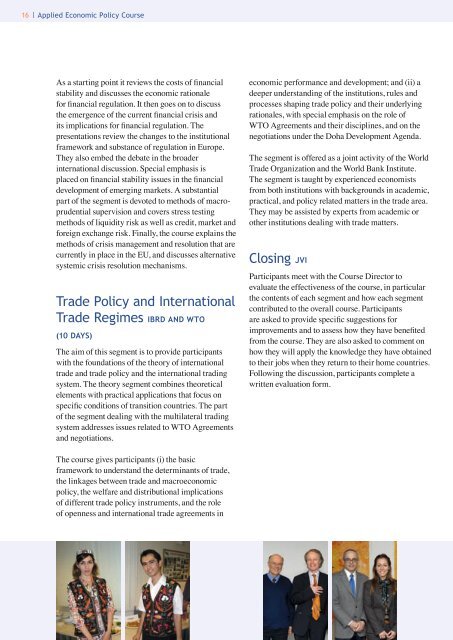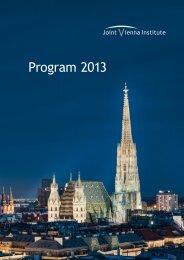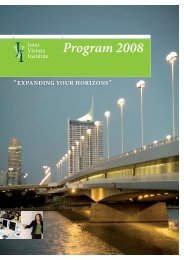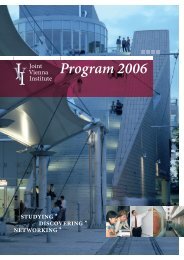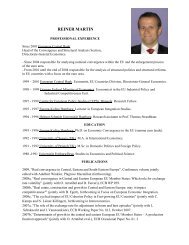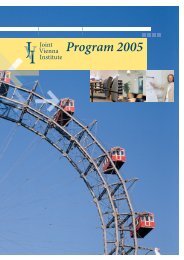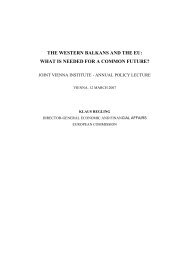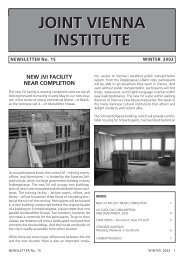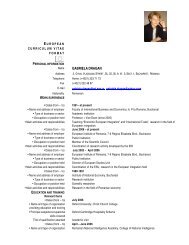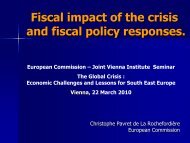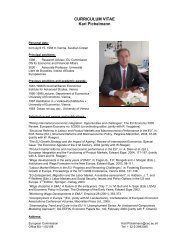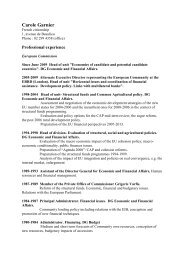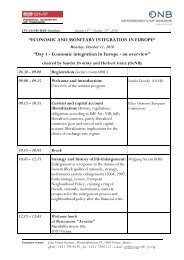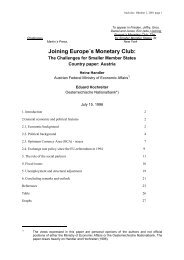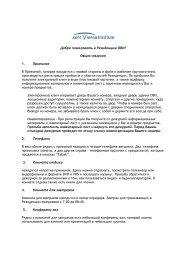Program 2010 - Joint Vienna Institute
Program 2010 - Joint Vienna Institute
Program 2010 - Joint Vienna Institute
- No tags were found...
Create successful ePaper yourself
Turn your PDF publications into a flip-book with our unique Google optimized e-Paper software.
16 | Applied Economic Policy Course<br />
As a starting point it reviews the costs of financial<br />
stability and discusses the economic rationale<br />
for financial regulation. It then goes on to discuss<br />
the emergence of the current financial crisis and<br />
its implications for financial regulation. The<br />
presentations review the changes to the institutional<br />
framework and substance of regulation in Europe.<br />
They also embed the debate in the broader<br />
international discussion. Special emphasis is<br />
placed on financial stability issues in the financial<br />
development of emerging markets. A substantial<br />
part of the segment is devoted to methods of macroprudential<br />
supervision and covers stress testing<br />
methods of liquidity risk as well as credit, market and<br />
foreign exchange risk. Finally, the course explains the<br />
methods of crisis management and resolution that are<br />
currently in place in the EU, and discusses alternative<br />
systemic crisis resolution mechanisms.<br />
Trade Policy and International<br />
Trade Regimes IBRD and WTO<br />
(10 days)<br />
The aim of this segment is to provide participants<br />
with the foundations of the theory of international<br />
trade and trade policy and the international trading<br />
system. The theory segment combines theoretical<br />
elements with practical applications that focus on<br />
specific conditions of transition countries. The part<br />
of the segment dealing with the multilateral trading<br />
system addresses issues related to WTO Agreements<br />
and negotiations.<br />
economic performance and development; and (ii) a<br />
deeper understanding of the institutions, rules and<br />
processes shaping trade policy and their underlying<br />
rationales, with special emphasis on the role of<br />
WTO Agreements and their disciplines, and on the<br />
negotiations under the Doha Development Agenda.<br />
The segment is offered as a joint activity of the World<br />
Trade Organization and the World Bank <strong>Institute</strong>.<br />
The segment is taught by experienced economists<br />
from both institutions with backgrounds in academic,<br />
practical, and policy related matters in the trade area.<br />
They may be assisted by experts from academic or<br />
other institutions dealing with trade matters.<br />
Closing JVI<br />
Participants meet with the Course Director to<br />
evaluate the effectiveness of the course, in particular<br />
the contents of each segment and how each segment<br />
contributed to the overall course. Participants<br />
are asked to provide specific suggestions for<br />
improvements and to assess how they have benefited<br />
from the course. They are also asked to comment on<br />
how they will apply the knowledge they have obtained<br />
to their jobs when they return to their home countries.<br />
Following the discussion, participants complete a<br />
written evaluation form.<br />
The course gives participants (i) the basic<br />
framework to understand the determinants of trade,<br />
the linkages between trade and macroeconomic<br />
policy, the welfare and distributional implications<br />
of different trade policy instruments, and the role<br />
of openness and international trade agreements in


